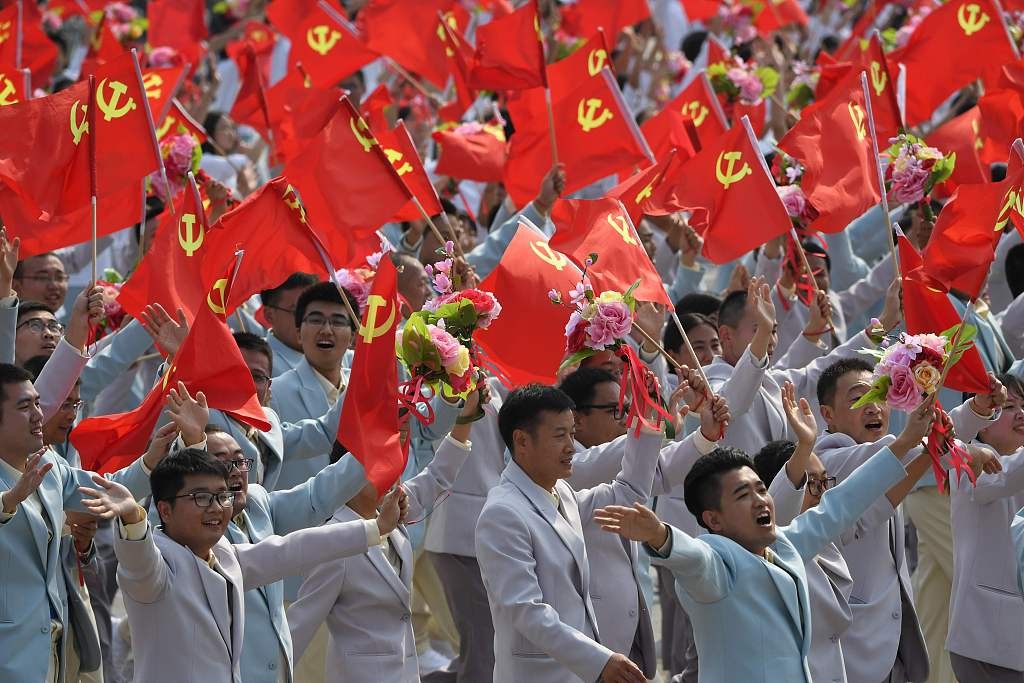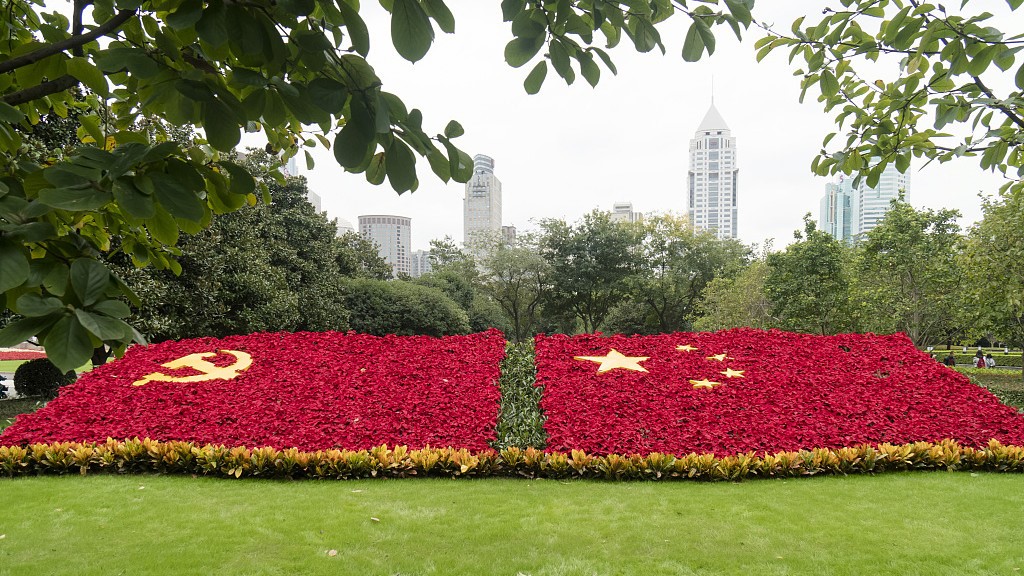CGTN: (高蕾、夏璐) 解读中国在历史背景下的国家治理能力
Understanding China's state governability in its historical context
(来源:CGTN, 2019-10-29)
Editor's note: Gao Lei is an assistant professor from Collaboration Centre for Theories and Practice of Open Economy, Centre for Xi Jinping Thoughts on Open-up at the University of International Business & Economics; Xia Lu is an assistant professor from National Academy of Development & Strategy at the Renmin University of China. Dr. Gao is the main contributor, and Dr. Xia is the corresponding author. The article reflects the authors' opinions and not necessarily the views of CGTN.
As the fourth plenary session of the 19th Central Committee of the Communist Party of China (CPC) is being held in Beijing, many observers might get confused with one of its major themes "to advance the modernization of China's system and capacity for governance." To understand this term better, it might help take a brief look at modern Chinese history.
While addressing in the ceremony of the 60th founding anniversary of the National People's Congress, Chinese President Xi Jinping pointed out that China's political institutions are viable and efficient because they are deeply rooted in the Chinese society.
Obviously, Xi was referring not only to the institutions established after 1949, but also to the broad and abundant resources of governing practices accumulated for centuries in ancient China, with centralized authority, standardized policy-making and implementation processes, being that an efficient administration was the central theme.
Searching for an effective way to govern a country has been one of the major themes across human history. As early as the Qin Dynasty (221 to 206 BC), China has started to establish a viable centralized bureaucratic system. This system experienced its peak during the Qing Dynasty (1644 to 1911).
At the same period in 1648, the Treaty of Westphalia was signed in the west, which has laid down the fundamental principles of the sovereignty of the nation-state regardless of size, location, population, religion, culture, and more importantly, political system. Although the Pope always craved unification of Europe under a single faith, local elites always resisted it. They feared to be treated as part of others, not as an independent entity enjoying discretion.
This is not to say that the West has established a modernized state governing body long before China; rather, judging by criterion created by Western scholars, ancient Chinese elites had already established a prototype of the modern state, with unified jurisdiction, a strong centralized authority, and a well-educated professional bureaucracy.
Needless to say, the word "modern" itself and everything that can be called "modernized" has been the product of the dominant Western culture since 17th and 18th century. Therefore, we need to be cautious when we discuss modern state governing bodies and effective governability in the contemporary Chinese context.

Since the mid-19th century, European imperialist and colonialist powers came to China and wanted to "help" China become "modernized" but according to their standards. Truth is, they might have impinged China's own path, or even worse, dragged China down to an anarchical and chaotic situation.
In this sense, from 1840 to 1949, the task for Chinese elites to build a modern state with a centralized and efficient governing body can be viewed as the process of reviving and perfecting a prototype of a modern state. With the state being revived, Chinese people can finally be revitalized.
Fortunately for Chinese people, this historical mission is destined to be fulfilled by the Communist Party of China (CPC). And the Party has always been cautious in governing the Chinese national economy and social change. The power of the state and market has been effectively combined. This is one of the rich resources and a manifested feature of the Chinese political system, a historical one deeply rooted in long-term political practice.
As the late Harvard political scientist Samuel Huntington claims in his work on political development: What matters is not the form of government, but state capacity. The most important political distinction among countries concerns not their forms of government but their degree in governance. In developing countries, there is a general shortage of strong state capacity that could hold people together and make improvements in the economy and people's lives. And we have full reason to believe that what the CPC is undertaking now is to revitalize Chinese state governability with modern criterion.

未经允许不得转载:大学门户 » CGTN: (高蕾、夏璐) 解读中国在历史背景下的国家治理能力
相关推荐
- 《中国财经报》:(李思奇)入世20年:中国与世界互利共赢
- 外语学院欢送2021年新入伍大学生
- 《中国电力报》:(董秀成)油价暴跌对上游开采业产生重大冲击
- 国际经济贸易学院召开全国党建标杆院系创建工作推进会
- 2020年欧洲孔子学院合作论坛在对外经济贸易大学成功召开
- 夏文斌校长会见中国个体劳动者协会会长庹登夫一行
- UIBE日本福山大学孔子学院2021年线上夏令营圆满结束
- 我校举办2021年度UIBE孔子学院工作联席会
- 《中国劳动保障报》:(苏丽锋)1100万人以上的就业目标如何实现
- 《党史中的纪律》第一期:党的纪律建设百年历程
- 马克思主义学院组织师生收看学习第二期《党课开讲啦》节目
- 中国国际电视台:(杨杭军)银西高铁开通能有效促进陕甘宁革命老区的发展
- 《光明日报》:(刘江宁)适合自己的舞台才是最好的就业选择
- "行"归故里 为"李"护航 :蒋庆哲书记视察行李寄送工作
- 七秩芳华,追忆名师(九)——冰心言热望 执笔译英华-对外经济贸易大学李平沤教授
- 夏文斌校长、洪俊杰副校长受邀出席第三届商务部经贸政策咨询委员会全体会议暨专题研讨会
- 第23届研究生支教团组织学习党的十九届五中全会精神
- 俄罗斯卫星通讯社:(王志民)巴基斯坦希望中国加速实施“软实力”项目
- “我是领学人”辅导员党史学习教育系列微课正式上线
- 学校召开2021年第28次党委常委会
新闻公告
- 党委中心组(扩大)专题学习全国“两会”精神 03-16
- 学校召开2022年第5次党委常委会 03-16
- 王敬波副校长出席出版社年度工作会议 03-16
- 《人民日报》:(张小锋)上好冬奥思政课(师说) 03-16
- 学校召开2022年第2次校长办公会 03-16
- 贸大近期科学研究进展(一) 03-15
- 我校成功举办“俄乌军事冲突前景及其影响研讨会” 03-15
- 我校组织新冠疫情日常防控及应急处置工作培训会 03-15
高考招生
- 对外经济贸易大学2017年招生章程 08-05
- 对外经济贸易大学招生章程(2018年) 08-05
- 对外经济贸易大学2015年招生章程 08-05
- 2016年对外经济贸易大学招生章程 08-05
- 对外经济贸易大学2014年本科招生章程 08-05
- 2014贸大远程秋季招生简章(学历) 08-05
- 对外经济贸易大学2012年招生章程 08-05
- 对外经济贸易大学2013年全日制普通本科招生章程 08-05
- 对外经济贸易大学2009年全日制普通本科招生章程 08-05
- 对外经济贸易大学2011年招生章程 08-05
